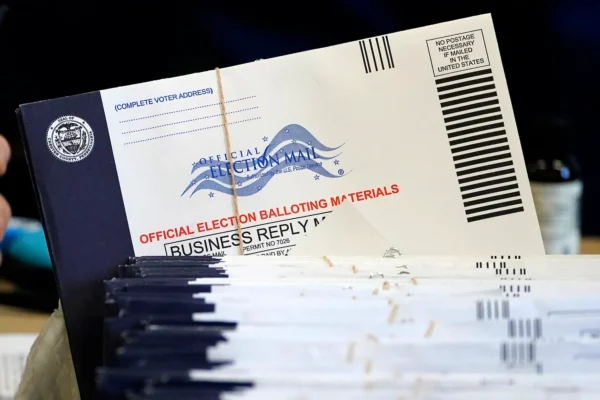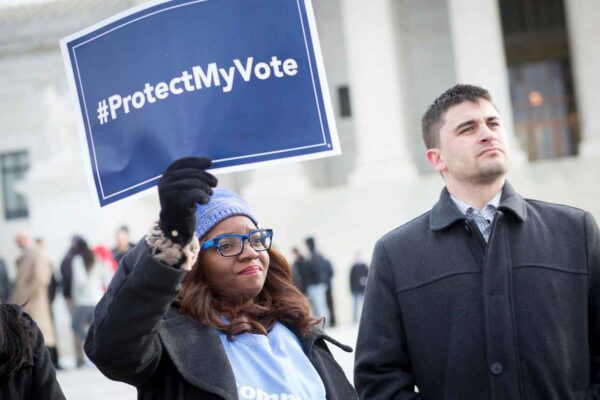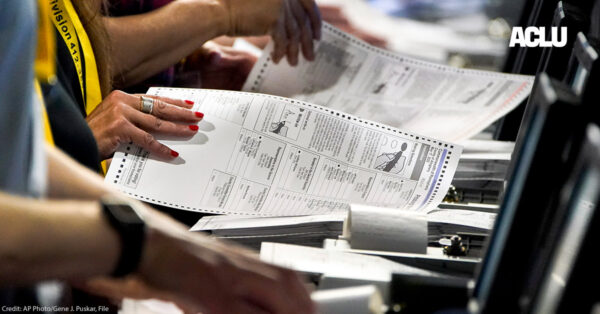Pennsylvania
All Cases
35 Pennsylvania Cases

Pennsylvania Supreme Court
Mar 2025
Voting Rights
Baxter v. Philadelphia Board of Elections
Eligible Philadelphia-area voters who submitted mail ballots in the September 17, 2024 special election only to have their votes set aside because they omitted or miswrote the correct date on their outer return envelope – even though the date is not used for any purpose – sued to have their votes count. Plaintiffs urge the courts to rule that enforcing the irrelevant envelope-dating requirement to disenfranchise eligible voters violates the Pennsylvania Constitution's Free and Equal Elections Clause.
Explore case
Pennsylvania Supreme Court
Mar 2025

Voting Rights
Baxter v. Philadelphia Board of Elections
Eligible Philadelphia-area voters who submitted mail ballots in the September 17, 2024 special election only to have their votes set aside because they omitted or miswrote the correct date on their outer return envelope – even though the date is not used for any purpose – sued to have their votes count. Plaintiffs urge the courts to rule that enforcing the irrelevant envelope-dating requirement to disenfranchise eligible voters violates the Pennsylvania Constitution's Free and Equal Elections Clause.

U.S. Supreme Court
Jan 2025
Voting Rights
Pennsylvania State Conference of the NAACP v. Schmidt
In November 2022, thousands of Pennsylvania voters were denied the right to vote based on a meaningless paperwork error. They filled out their mail ballots, signed the form on the outer return envelope, and returned their ballots on time. Yet their ballots were not counted, because they either forgot to write the date on their return envelope, or they accidentally wrote the wrong date. The Civil Rights Act prohibits states from disenfranchising voters based on immaterial paperwork error, and we're fighting to make sure that every vote counts
Explore case
U.S. Supreme Court
Jan 2025

Voting Rights
Pennsylvania State Conference of the NAACP v. Schmidt
In November 2022, thousands of Pennsylvania voters were denied the right to vote based on a meaningless paperwork error. They filled out their mail ballots, signed the form on the outer return envelope, and returned their ballots on time. Yet their ballots were not counted, because they either forgot to write the date on their return envelope, or they accidentally wrote the wrong date. The Civil Rights Act prohibits states from disenfranchising voters based on immaterial paperwork error, and we're fighting to make sure that every vote counts

Pennsylvania Supreme Court
Nov 2024
Criminal Law Reform
Commonwealth of Pennsylvania v. Shivers
This case in the Pennsylvania Supreme Court asks whether flight from the police in a high-crime area, without more, can justify an investigative stop. The ACLU’s State Supreme Court Initiative, alongside the ACLU of Pennsylvania, filed an amicus brief arguing that it does not. The brief argues that the Pennsylvania Constitution supports broader protections against investigative stops than those recognized under the U.S. Constitution, and that flight in high-crime areas is not inherently more suspicious than flight elsewhere.
Explore case
Pennsylvania Supreme Court
Nov 2024

Criminal Law Reform
Commonwealth of Pennsylvania v. Shivers
This case in the Pennsylvania Supreme Court asks whether flight from the police in a high-crime area, without more, can justify an investigative stop. The ACLU’s State Supreme Court Initiative, alongside the ACLU of Pennsylvania, filed an amicus brief arguing that it does not. The brief argues that the Pennsylvania Constitution supports broader protections against investigative stops than those recognized under the U.S. Constitution, and that flight in high-crime areas is not inherently more suspicious than flight elsewhere.

Pennsylvania Supreme Court
Sep 2024
Voting Rights
New PA Project Education Fund v. Schmidt
On September 25, 2024, 10 organizations filed a suit in the Pennsylvania Supreme Court, asking the court to stop enforcement of the commonwealth’s requirement that voters include an irrelevant handwritten date on the outer return envelope of their mail ballot packets or else be disenfranchised.
Explore case
Pennsylvania Supreme Court
Sep 2024

Voting Rights
New PA Project Education Fund v. Schmidt
On September 25, 2024, 10 organizations filed a suit in the Pennsylvania Supreme Court, asking the court to stop enforcement of the commonwealth’s requirement that voters include an irrelevant handwritten date on the outer return envelope of their mail ballot packets or else be disenfranchised.